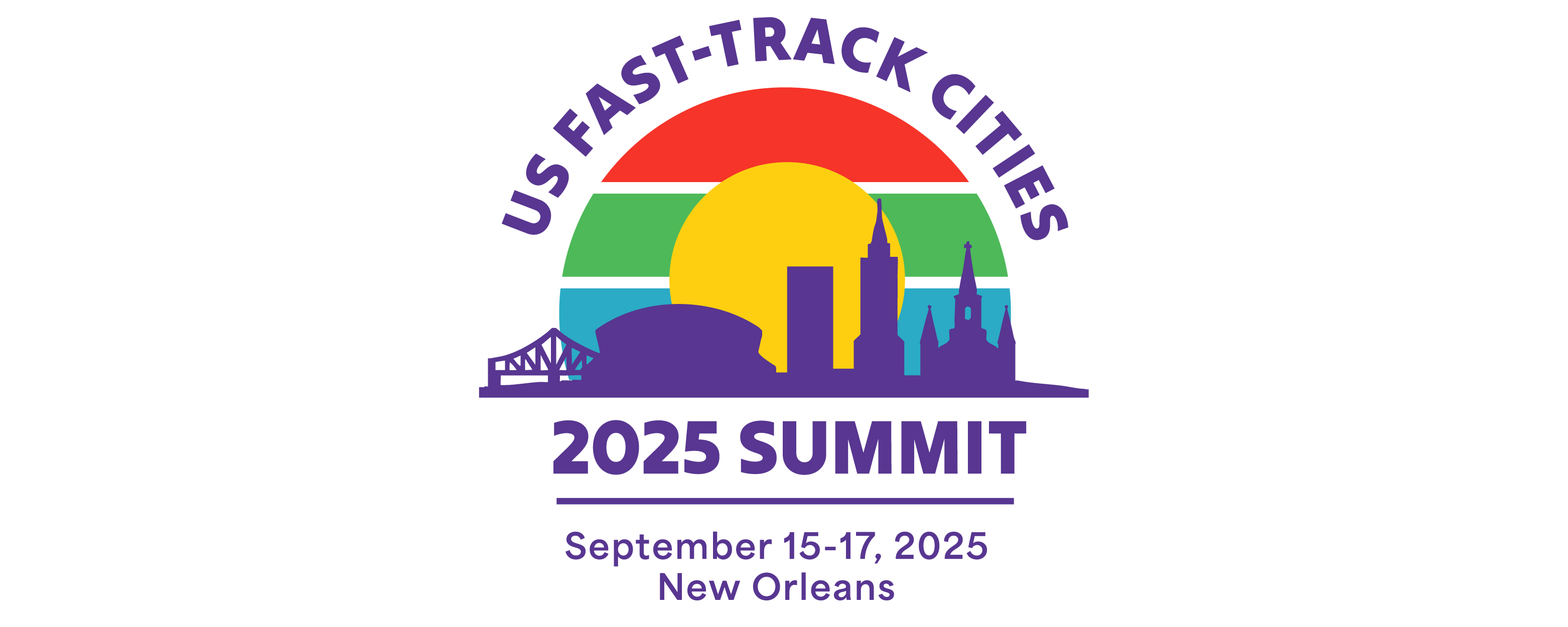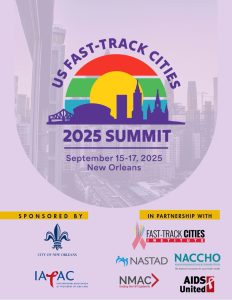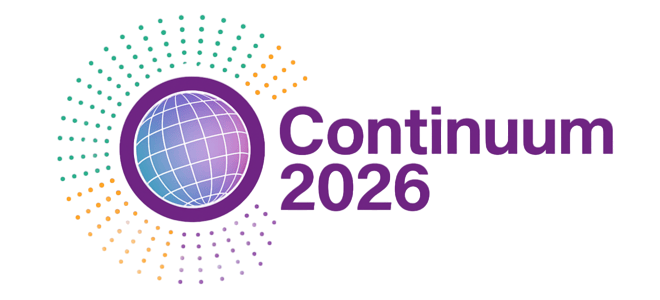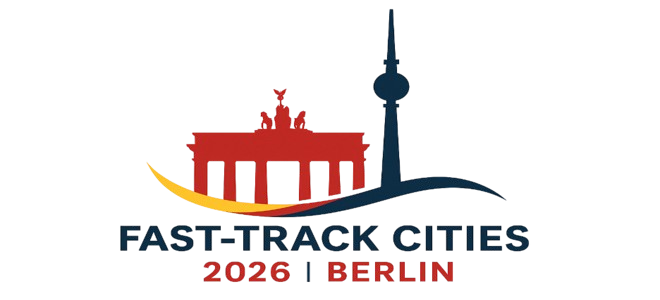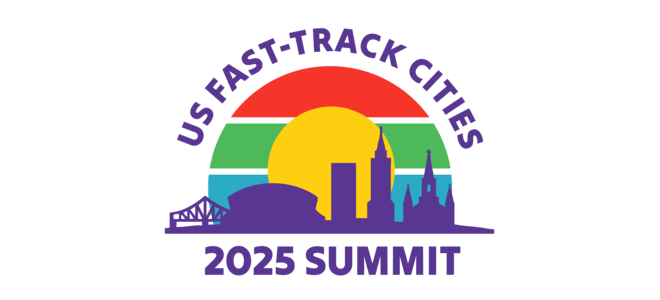Conference Archives:
The US Fast-Track Cities 2025 Summit convened September 15-17, 2025, in New Orleans, Louisiana, bringing together public health officials, policymakers, healthcare providers, community-based organizations, and community leaders from more than 50 cities and counties in the Fast-Track Cities network and other priority Ending the HIV Epidemic (EHE) initiative jurisdictions.
Convening at a strategic midpoint to the 2030 goal of reducing new HIV infections by 90% nationwide, the Summit offered a forum for sharing practical strategies, lessons learned, and data-informed innovations that support local implementation of the EHE initiative. The program emphasized evidence-based approaches to HIV prevention, care, and treatment that are responsive to evolving policy environments and fiscal conditions.
Across six tracks, the summit covered a wide range of topics including, advancing progress toward the 2025 and 2030 EHE initiative targets; expanding access to high-impact HIV prevention and treatment tools; strengthening integration of HIV services into primary care systems; enhancing local HIV response coordination through multisector partnerships; planning contingencies for HIV service continuity in dynamic funding landscapes.
Click here to read the Summit report summarizing key takeaways and a Fast-Track Cities action plan.
The following are conference presentations in PDF format uploaded with presenting author permission. The conference organizers request that any use of these presentations should include citations to both their presenting authors and relevant conference information (e.g., US Fast Track Cities 2025 Summit, September 15-17, 2025, New Orleans, LA).
Summit Program Book
Monday, September 15, 2025
Opening Ceremony: Fast-Track Cities Rising: A Decade of Progress, A Future of Resilience
- Jennifer Avegno (New Orleans Department of Health)
- Morris Singletary (The PoZitive2poSitive Initiative, New Orleans, LA)
- José M. Zuniga (IAPAC & FTCI, Washington, DC, USA)
Keynote Address: From Resilience to Justice: Fast-Tracking Health in New Orleans and Beyond
- Jennifer Avegno (New Orleans Department of Health)
High-Level Panel: Leading Where It Matters: Municipal Leadership to End the HIV Epidemic
- Chiara Berrios Carrasquillo (San Juan Municipality, Puerto Rico)
- Stephen Lee (NASTAD, Washington, DC)
- Morris Singletary (The PoZitive2poSitive Initiative, New Orleans, LA)
Panel 1 Discussion: Tracking Progress: Are We on Track to Achieve the US HIV Incidence Targets?
Plenary Session 1: Community-Anchored: Person-Centered HIV Prevention to Close Gaps
- Leisha McKinley-Beach (Black Public Health Academy, Atlanta, GA)
Panel Discussion 2: Continuity of HIV Care: Person-Centered Coordination and Coverage
- Ramatoulaye Keita (Whitman-Walker Health, Washington, DC)
- Heather Shoop (Clark County Social Services, Las Vegas, NV)
Oral Abstracts Sessions 1(Concurrent)
Community-Centered Prevention
3 Misconceptions and Momentum: Baseline Evidence Supporting Group PrEP Care for Sex Workers
Akoben Kline
14 STI Testing: A Gateway to HIV Diagnoses in Black and Latino Youth
Cherise Rohr-Allegrini
36 Centering Narratives in HIV Prevention for Black Women: A Community-Engaged Approach to Develop a Story-Based Social Media Intervention
Alyssa Robillard
From Prevention to Retention: Closing the Gaps
1 Strengthening PrEP Access and Peer Support in Group Care: C-PrEP+
Randi Singer
2 Optimizing Status-Neutral Group Care Models for Equitable HIV Prevention and Care Research
Maya Green
33 Forming Genuine Bonds: Retention Strategies for Women in HIV Research
Victoria McDonald
Optimizing HIV Treatment Access
16 Healthy Balance Weight Management Initiative in HIV Care
Paula Seal
49 Treatment “Saving the Rest of Your Life”
Rene’ Taylor
Strengthening the Care Continuum
9 HPV Related Neoplasm Incidence and Mortality Risks among a Hispanic Cohort of People Living with HIV in Puerto Rico
Angel Mayor
13 Creation of a Low-Barrier Open Access HIV Care Clinic to Address the HIV Care Continuum in New Orleans, Louisiana
Lauren Richey
15 Rapid Reentry into HIV Care to Improve Retention in Care at a HIV Clinic in New Orleans, LA
Paula Seal
18 Prevention through Preparation can Mitigate Challenges to continued HIV Care during and after a Natural Disaster
Lauren Richey
19 Patient Portal Engagement and HIV Outcomes: A Retrospective Cohort Analysis of MyChart Use in a Southern Urban Clinic
John Phillips
Tuesday, September 16, 2025
Show Us the Money: Scaling HIV Responses in a Changing Funding Landscape
- Athena Cross (AIDS United, Washington, DC)
Panel Discussion 3: Strategic Funding: Block Grants, Budget Advocacy, and the State-Local Nexus
- Ali B. Mansaray (SC Department of Public Health, Cayce, SC)
- Elizabeth A. Torrance (AIDS Alabama, Birmingham, AL)
- Alecia M. Tramel (Positive People Network, Miami, FL)
Plenary Session 3: Informed Advocacy: Using HIV and Other Data to Show an ROI Proposition
- Carl Baloney, Jr. (AIDS United, Washington, DC)
Panel Discussion 4: Public-Private Partnership: Expanding Impact through Shared Responsibility
- Tyler TerMeer (San Francisco AIDS Foundation, San Francisco, CA)
Oral Abstracts Session 2 (Concurrent)
Diverse Strategies for Engagement
28 Evaluating the Impact of Housing Assistance on Antiretroviral Therapy Adherence
Cherise Rohr-Allegrini
37 Designing Community-led and Trauma-informed Research Strategies for Southern Priority HIV Care Organizations
Lauren Brown
43 “I Trust Them with My Life”: The Desire for Increased Provider Communication Around Human Papillomavirus (HPV) Vaccination and Anal Cancer Screening among People with HIV in the Deep South
TJ Wood
44 Building Momentum from Outreach to Outcomes: Scaling Confidential, Client-Centered HIV Linkage, Retention, and Re-Engagement
Celeste Carter
46 ED CONNECT: Bridging ED to Outpatient Care – Lessons From the South
Piper Duarte
Stigma, Policy, and Advocacy
26 The End Starts With U: Unifying HIV Service Delivery
Zandraetta Tims Cook
35 From Stigma to Strategy: Maryland’s Full Repeal of HIV Criminalization Laws as a National Model for Advocacy and Legislative Reform
Ronnie Taylor
38 Staff Coaching in a Redesigned Case Management Program
Maggie Robert
40 Reducing Stigma and Taking Action: Increasing PrEP Uptake among Women of Color Using Groundbreaking Strategies
Nathan Maxey
Systems Innovation and Quality Improvement
6 Assessing Readiness for Quality Improvement: A Tool to Enhance HIV Care Outcomes
Nia Holden
21 Leveraging GIS and Health Department Partnerships to Inform HIV Testing Outreach in Coastal Alabama
John Bassler
29 From Insight to Impact: Cultural Humility as a Strategy for HIV Health Equity
Adrianna Boulin
41 “If We Would Educate More, They Would Trust More”: Missed opportunities to implement PrEP in methadone clinic settings in the Deep South
Jessica Jaiswal
Tackling Social Drivers of HIV
4 Radical Rapport: A Culturally Rooted, Trauma-Informed Model for Engaging Marginalized Communities in HIV Care
Ashley Elliott
27 Disadvantaged Neighborhoods and HIV Health Outcomes: The Path to Ending the HIV Epidemic (EHE) in a Deep South Fast Track City
John Bassler
42 Push-and-Pull Drivers of Residential Mobility and HIV Care Engagement among Mobile People with HIV in the US Southeast: A Health-Systems Perspective
Jessica Perkins
Plenary Session 4: Bridging Care: Faith Communities Engaged in Accelerating HIV Responses
- Bishop OC Allen (Vision Community Foundation, Atlanta, GA)
Panel Discussion 5: Rooted in Resilience: Power of Communities to Change the HIV Narrative
- Sy’ria Jackson (Ryan White Resources & Services, New Orleans, LA)
Wednesday, September 17, 2025
Plenary Session 5: Integrated Chronic Care: Positioning HIV within a Whole-Health Framework
- MarkAlain Déry (Access Health Louisiana, New Orleans, LA)
Plenary Session 6: Syndemic Approach: Addressing STIs, Mental Health, and Substance Use
- Sarah Braunstein (NYC Department of Health & Mental Hygiene, New York, NY)
Panel Discussion 6: Models of Care: Supporting a New Workforce for Person-Centered HIV Care
Panel Discussion 7: Cities as Catalysts: Advocacy, Accountability, and the Path to 2030
- J Ashenayi (AIDS Free Pittsburgh, Pittsburgh, PA)
- Anne Cronyn (City of Tampa, Tampa, FL)
- Marlene McNeese (Houston Health Department, Houston, TX)
Closing Session: Shared Commitment: Finding Strength in New Orlean’s Resilience
